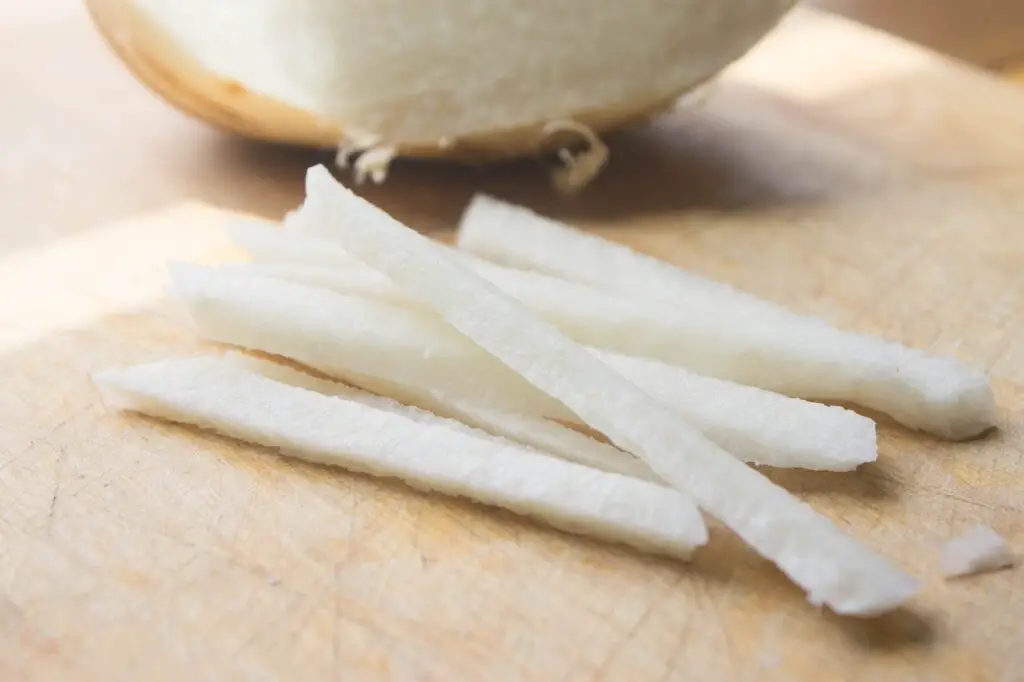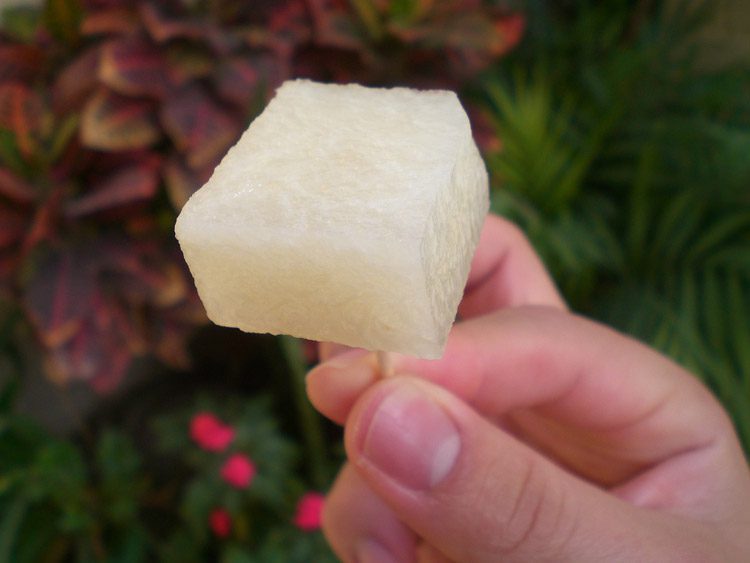As a veterinarian nutritionist with years of experience working closely with dogs, I’m often asked if certain human foods are safe for our furry friends.
One such food that has recently gained popularity is jicama – a root vegetable commonly used in Latin American cuisine.
While it’s always important to be cautious when introducing new foods into your dog’s diet, the good news is that jicama can actually be quite beneficial for them!
In this article, we’ll take an in-depth look at what exactly jicama is and whether or not it’s okay to share some slices with your pup every once in a while.
Can Dogs Eat Jicama?

Yes, dogs can eat Jicama without the skin, stem, leaves, and seeds in moderation. Jicama is low in calories and contains high amounts of fiber, vitamin C, potassium, and magnesium which are all important nutrients for your dog’s health.
However, it should be noted that while jicama root itself is not toxic to dogs when consumed raw or cooked (unseasoned), the skin may cause digestive upset if ingested.
I recommend cutting up small pieces of peeled jicama as an occasional treat instead of feeding large chunks at once because excess consumption could lead to gastrointestinal problems such as diarrhea or vomiting due to its high fiber content.
Additionally, it’s best practice always put forth caution before giving new food items like this one especially If you have concerns about allergies or other underlying medical conditions affecting their digestion system.
Overall though, Jicima has many beneficial properties making it a great addition to your canine companion diet but providing them too much might pose some risks so make sure you consult with your vet beforehand!
See also: 47 Safe Vegetables To Feed Your Dog. Puppy Power!
How Much Jicama Can Dogs Eat?

As a general guideline, it is recommended that dogs be given no more than 10% of their daily diet in treats, and jicama should be considered as part of this overall daily intake.
Jicama is a root vegetable that is safe for dogs to eat in moderate amounts. However, it is important to note that jicama should be given to dogs in small quantities, as excessive consumption can cause stomach upset or digestive issues.
It is also important to ensure that the jicama is washed and peeled before giving it to your dog to avoid any potential ingestion of harmful pesticides or chemicals.
As with any new food being introduced into your dog’s diet, it is always best to start with small amounts and monitor your dog’s reaction before increasing the intake.
Jicama Feeding Chart According To Size
| Food | Size | Portion |
|---|---|---|
| Jicama | Toy dogs | 2 slices |
| Jicama | Small dogs | 3 slices |
| Jicama | Medium dogs | up to 4 slices |
| Jicama | Large Dogs | up to 5 slices |
Jicama Feeding Chart According To Age
| Food | Age | Portion |
|---|---|---|
| Jicama | 0 – 6 months | Don’t feed |
| Jicama | 6 – 12 months | 2 slices |
| Jicama | 12 – 24 months | up to 4 slices |
| Jicama | 24+ months | up to 5 slices |
How Often Can Dogs Eat Jicama
As a treat, jicama can be offered to dogs once or twice a week, but it should not make up a significant portion of their diet.
While jicama is generally safe for dogs to eat in moderation, it is important to keep in mind that it should not be a regular fixture of their diet.
Dogs require a balanced diet of protein, vegetables, grains, and other nutrients to maintain their health, and relying too heavily on any one type of food can result in nutrient deficiencies or other health issues.
Additionally, any new foods should be introduced slowly and in small amounts to ensure that your dog’s digestive system can handle the change.
Health Benefits of Jicama To Dogs
- Promotes healthy digestion. Jicama contains significant amounts of dietary fiber, which can aid in digestion and help regulate bowel movements. This can be particularly beneficial for dogs with digestive issues or those who are prone to constipation or other stomach problems.
- Boosts immune system. Jicama is an excellent source of vitamin C, a powerful antioxidant that can help strengthen the immune system and fight off disease and infection. This can be especially helpful for dogs with weakened immune systems or those recovering from illness or injury.
- Supports bone health. Jicama contains several essential minerals, including magnesium, calcium, and potassium, which can help promote strong bones and teeth. This can be particularly important for aging dogs or those with conditions that put them at risk for bone and joint problems.
- Contributes to healthy weight management. Jicama is a low-calorie, low-fat, and low-sugar vegetable that can be a healthy addition to a dog’s diet. Its high fiber content can also help dogs feel fuller and more satisfied, which can support healthy weight management and prevent overeating.
- Provides a crunchy, satisfying treat. Many dogs enjoy the taste and texture of jicama, and it can be a healthy alternative to more calorie-dense treats. Its crunchy texture can also help promote dental health by removing plaque and tartar buildup from teeth and gums.
Potential Risks of Feeding Jicama To Dogs
- Digestive upset. While jicama can be beneficial for digestion in small amounts, excessive consumption can lead to gas, bloating, and other digestive issues. Dogs with sensitive stomachs may be particularly prone to these problems.
- Choking hazard. Jicama is a hard, crunchy root vegetable that can pose a choking hazard to dogs, especially those who are prone to swallowing large pieces without chewing them properly.
- Allergic reactions. While rare, some dogs may be allergic to jicama or other root vegetables. Signs of an allergic reaction can include itching, swelling, and digestive upset.
- Pesticide exposure. If not properly washed and peeled, jicama can contain residual pesticides or other harmful chemicals that can be toxic to dogs. Always be sure to thoroughly wash and peel any vegetables before feeding them to your dog.
- Interference with medications. Jicama contains a compound called inulin, which can interfere with the absorption of certain medications. If your dog is on medication, consult with your veterinarian before introducing jicama or any other new foods to their diet.
Nutritional Benefits of Jicama For Dogs
| Jicama Nutrition Facts per 100 grams | % DV * |
|---|---|
| Calories | 38 |
| Total Fat | 0.1 g |
| Cholesterol | 0 mg |
| Sugar | 1.8 g |
| Glycemic Index | 17 |
| Sodium | 4 mg |
| Carbs | 9 g |
| Protein | 0.7 g |
| Vitamin D | 0% |
| Calcium | 1% |
| Iron | 3% |
| Potassium | 150 mg |
Are Dogs Sensitive To Jicama?
While jicama is generally safe for dogs to eat in moderation, some dogs may be sensitive or have an allergic reaction to the vegetable.
Symptoms of jicama sensitivity in dogs can vary depending on the individual dog and the severity of the response but may include:
- Digestive upset: Jicama, like many root vegetables, can contain natural sugars that can be difficult for some dogs to digest. Eating too much jicama can cause vomiting or diarrhea.
- Itching or scratching: Some dogs with jicama sensitivity may experience itching or scratching, particularly around the mouth or face.
- Swelling: A severe reaction to jicama can cause swelling of the lips, tongue, or throat, which can interfere with your dog’s breathing and require immediate veterinary attention.
- Hives or rash: Jicama sensitivity can also manifest as hives or a rash, especially around the mouth or face.
- Lethargy or weakness: Dogs who are particularly sensitive to jicama or ingested large amounts of the vegetable may become lethargic or weak.
If your dog exhibits any of these symptoms after eating jicama or any other food, it is important to contact your veterinarian right away.
They can help determine the cause of the symptoms and provide appropriate treatment. It is also recommended to start with small amounts of jicama to observe any existing sensitivity to the vegetable in your dog.
How To Prepare Jicama For Dogs
- Wash and peel raw jicama, and cut it into small, bite-sized pieces. You can offer these to your dog as a crunchy snack, either on their own or mixed with other fruits or vegetables.
- Roast jicama in the oven with a small amount of olive oil and seasonings like rosemary or cinnamon. Once cooled, cut into bite-sized pieces and offer as a healthy alternative to more processed treats.
- Blend raw jicama with other vegetables and a high-quality protein source like grilled chicken or ground turkey to make homemade dog food. Be sure to work with your vet to ensure the recipe is balanced and meets your dog’s nutritional needs.
How Fast Will Dogs Digest Jicama
Dogs can digest jicama relatively quickly, usually within a few hours of consuming it.
However, the exact length of time it takes for a dog to digest jicama can depend on several factors, including the dog’s size and digestive system, as well as how much of the vegetable it ate.
Jicama is a high-fiber food, so dogs with sensitive stomachs or those not used to high-fiber diets may take longer to digest it than others.
As with any new food being introduced into a dog’s diet, it is always best to start with small amounts and monitor their reaction to ensure that they can handle the change without experiencing digestive upset or other adverse effects.
If your dog experiences any symptoms of digestive distress after eating jicama, it is best to consult with your veterinarian to assess the situation and determine if any further action is necessary.
FAQs
Can dogs eat jicama leaves?
No, jicama leaves are not a safe food source for dogs. Jicama is a root vegetable, and while the tuber itself can be safely consumed by dogs in small amounts, the leaves contain an alkaloid called rotenone which can cause vomiting and diarrhea.
Can dogs eat jicama skin?
No, it’s not recommended that you feed your dog Jicama skin. Jicama skin can be difficult to digest and might cause an upset stomach for your pup. Additionally, the skin of jicama may contain trace amounts of pesticides or other chemicals which could be harmful to your pet.
Can dogs eat jicama stem?
No, jicama stems are not recommended for dogs. The stem of jicama, which is also known as the Mexican yam bean, can be hard and fibrous. This makes it difficult for dogs to digest, potentially leading to vomiting and diarrhea.
Can dogs eat jicama seeds?
No, dogs should not eat jicama seeds. The seeds of the jicama plant contain a compound called rotenone, which can be toxic to your pup if ingested. In addition, the hard outer shell of the seed can be difficult to digest and may cause intestinal blockage.
In Conclusion
Jicama can be a healthy and enjoyable treat for dogs when given in moderation and as part of a balanced diet.
This crunchy root vegetable offers several potential health benefits, including aiding digestion, supporting the immune system, promoting healthy bones, and contributing to healthy weight management.
However, jicama should always be fed in moderation and prepared properly, as excessive consumption or improper preparation can lead to digestive upset, choking hazards, or other potential risks.
As with any new food being introduced into your dog’s diet, it is important to start with small amounts and monitor your dog’s reaction before increasing the intake.
If you have any questions or concerns about feeding jicama to your dog, don’t hesitate to consult with your veterinarian.





Leave a Reply